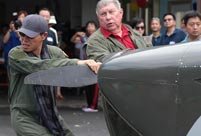

For the US, the Latin American continent has been an important neighbor with strategic significance. In order to have a firm control over the region, the White House adopted a “puppet strategy” of using economic aid to buy loyalty.
However, history has proved that its calculation came to naught as the US dollar failed to buy the loyalty of its neighbors. Nowadays, with the decline of its economy, the US is losing control over Latin America.
During the Cold War, the success of the Cuban Revolution threatened US hegemony in the Western hemisphere in terms of both geopolitics and ideology. In a bid to prevent the emergence the second socialist country in the West, Washington, in the1960s,adopted a plan called “Alliance for Progress” to establish economic cooperation between the US and Latin America.
The US then selected Chile as a prototype,hoping to build the latter into a “democracy window” of the US in Latin America.During the 1964 Chilean presidential election campaign, it supportedreformistEduardo FreiMontalvawho was sympathetic toward American capital.A donation of $3 million brought Freithe crown.
From 1962 to 1969, Chile received $1 billion in US aid, the most among Latin American countries in terms of percapita amount. However, things didn't go the way the US had wished. Frei adopted an independent foreign policy after he took office, and even published an article criticizing the “Alliance for Progress.”
Things got worse after Salvador Allende, who was more disobedient to the US, assumed the presidency in 1970. It marked the ultimate failure of the superpower, who had spent $1 billionand eight years on the program.
History shows the loyalty of neighboring countries could not be bought. The plan to turn Chile into a “democracy window”proved to be an example of its flawed diplomacy.
But the White House reapplied the strategy of trading "friendship" with money in March. US President Barack Obama visited Cuba and Argentina with hundreds of businessmen to expand USinvestments in Latin America.
However, Latin America disappointed the US again.The US and Cuba barely reached consensus on Cuban migrants in the US, the Guantanamo military base and domestic political agendas because of the huge differences in political systems and ideologies.
In addition, ties between Argentina and the US also showed no signs of recovery, though the US added $2.5 billion in investments. According to a poll by two universities in Argentina, 45 percent doubted the ability of the US to contribute to world peace.
Since the Latin American countries, with a unique political and social culture, value independence very much, the US plan to trade “friendship” with money is destined to fail.
Both history and reality have proven that the US is doomed to fail to control other countries with money. The White House launched these policies towards Latin America hopingto protect its own interests and hegemony, but turned a blind eye to the regional reality as well as its people’s aspiration for independent development.
Its strategies, featuringdollar diplomacy and a big-stick policy, exposed its hegemony and power politics in the Western hemisphere. These are also the reasons why US plans have repeatedly been frustrated.
(The author is an associate researcher with the Institute of Advanced International Studies under Sun Yat-SenUniversity)
 Home-made plane completes test flight in Chicago
Home-made plane completes test flight in Chicago The untold stories of women in the Long March
The untold stories of women in the Long March Female soldiers on Frigate Jingzhou
Female soldiers on Frigate Jingzhou Top 10 most beautiful Chinese athletes in Rio
Top 10 most beautiful Chinese athletes in Rio Shenzhen seizes 549 tons of illegally smuggled clothing
Shenzhen seizes 549 tons of illegally smuggled clothing Chinese actor Wang Baoqiang divorces wife, fires manager
Chinese actor Wang Baoqiang divorces wife, fires manager Hangzhou: host city of G20 Summit
Hangzhou: host city of G20 Summit New hovercrafts debut in landing exercise
New hovercrafts debut in landing exercise Woman sets Guinness World Record with 17-month-long pregnancy
Woman sets Guinness World Record with 17-month-long pregnancy Top 10 livable Chinese cities
Top 10 livable Chinese cities Top 20 hottest women in the world in 2014
Top 20 hottest women in the world in 2014 Top 10 hardest languages to learn
Top 10 hardest languages to learn China’s Top 10 Unique Bridges, Highways and Roads
China’s Top 10 Unique Bridges, Highways and Roads King’s death leaves Thai leadership vacuum
King’s death leaves Thai leadership vacuum
 Veterans sent home with high officials' promises after protests in Beijing
Veterans sent home with high officials' promises after protests in Beijing
 People stuck with ex-spouses’ loans band together
People stuck with ex-spouses’ loans band together
 Foreigners face stiff resistance from the families of their Chinese partners during dating and even after marriage
Foreigners face stiff resistance from the families of their Chinese partners during dating and even after marriage
Day|Week